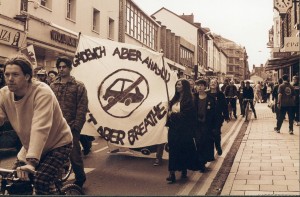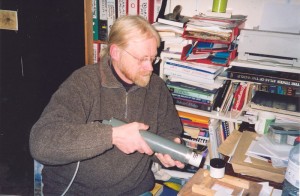What is Green Audit?
Green Audit is ultimately about corporate responsibility. Scientific research and statistical analysis conducted by Green Audit uncovers the truth about statements made by national governments, large multinationals and the military with regard to the health effects of environmental pollution.
Green Audit was founded in 1992 as an environmental consultancy and review organisation with the aim of monitoring the performance of companies and organizations whose activities might threaten the environment and the health of citizens. Democratic values are threatened when information is kept from the public and all routes of access are controlled. The aim of Green Audit is to give citizens the information they need to be able to question the companies which are destroying the environment we all depend on. It was the worrying recognition that such information is presently suppressed and restricted which provided the impetus for the founding of Green Audit.

It has become increasingly clear that the scientific measurement and appraisal of human health risks, including pollution, are in the hands of the government and establishment-controlled organizations. The late recognition by policy-makers of the importance of climate change, and their refusal to listen to environmentalists in the face of the powerful lobbying of vested interests makes it clear that politicians cannot be relied on to defend the citizens against the interests of big business. Similarly, during recent scares over food safety, and particularly over the issue of BSE, it became clear that MAFF was acting as an apologist for the food industry rather than in the interests of consumers. The same was found with genetically modified foods, when government bowed to the pressure of agribusiness and independent research was quashed, and in the foot-and-mouth crisis, when Nestlé blocked the use of vaccination to control the disease.
So who will protect the citizen? It is commonly thought that this role should be left to pressure groups, but the nature and structure of such groups ensures that their responses miss the point. Pressure groups are increasingly constrained to avoid political activity since their financial base depends upon cross-party support. Furthermore, it is generally true that the larger and more institutionalized the campaigning group is the more its style is limited by the political beliefs of its supporters. A consequence of this is that radical groups are almost always small and poor.

Pressure group campaigners are being brought more and more into the policy-making process to act as advisers and ‘experts’. But as this happens they become acculturated: they learn to speak the same language as policy-makers and their critical edge can be lost. Pressure groups always concentrate on a narrow range of issues, whereas Green theory holds that problems can rarely be isolated from each other and a holistic approach is necessary.
The problems of the pollution of the planet are inextricably related to the market-driven industrial system. An understanding of the connections and the forces between these different engines for change is critically important if we are to discover a way forward. We need to disentangle the links which prevent us dismantling one of these destructive systems in isolation. For example, electricity produced by nuclear power is powering hospitals; people in those hospitals are dying of cancer as a consequence of nuclear pollution. This is, in microcosm, an example of the runaway feedback which threatens us all. Although Green Audit started as an environmental fire-alarm, owing to a developing appreciation of the holistic nature of the interactions which are beneath the surface changes in the environment, it is expanding research into their economic and social origins.

Green Audit undertakes and supports independent studies in the general areas of environmental public health, pollution, energy efficiency, and social and policy research in relevant areas. It is in on-line, networked communication with similar organizations and environmental databases worldwide so that any new threat to humanity can be monitored and evaluated.
Dr. Chris Busby addressing the International War Crimes Tribunal. Kuala Lumpur 2007
Green Audit Researchers
Green Audit’s founders were Chris Busby Patrick Adams and Molly Scott Cato. Patrick Adams left the operation in 1995 to become a farmer in Devon. Chris has a first-class Honours degree in Chemistry from London University and a PhD in chemical physics from the University of Kent. He is Scientific Secretary of the European Committee on Radiation Risk and a member of the UK Department of Health Committee Examining Radiation Risk for Internal Emitters (CERRIE) (www.cerrie.org). He also sits on the UK Ministry of Defence Depleted Uranium Oversight Board (www.duob.org) and in National Speaker on Science and Technology for the Green Party of England and Wales. Chris is a fellow of the University of Liverpool in the Faculty of Medicine. He is also scientific advisor of the Low level Radiation Campaign (www.llrc.org) which he helped to set up in 1995.
Dr Chris Busby

Molly Scott Cato studied politics, philosophy and economics at Oxford University and holds an MSc from the Open University in Social Research Methods and a PhD in economics from the University of Wales, Aberystwyth. She has been investigating the future of work in the Rhondda Valleys of South Wales and developing new theoretical directions in Green economics. Molly now works at the University of Wales Institute, Cardiff researching Co-Operatives. Sadly, Molly is no longer with Green Audit but is now contactable at www.gaianeconomics.org.
Other researchers with Green Audit presently include Dr Paul Dorfman and Mr Richard Bramhall, Mireille de Messieres, Saoirse Morgan.
Saoirse Morgan 
Green Audit welcomes interaction with other researchers in related fields and seeks to encourage others to undertake their own independent research. Those seeking support with publication or dissemination of novel research should contact us.


